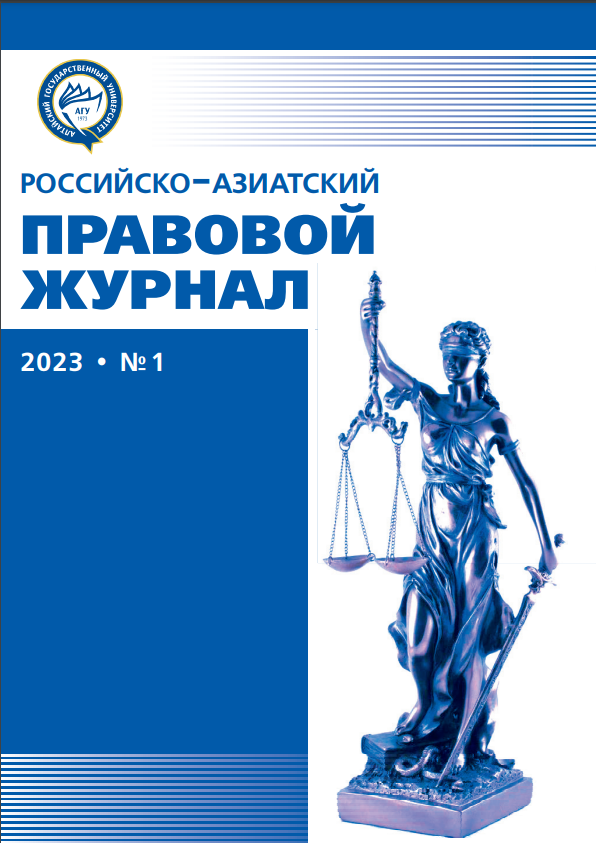HISTORICAL AND LEGAL AND COMPARATIVE ASPECTS OF COUNTERING EXTREMISM
УДК 347:349.2 ББК 67.405.02
Abstract
The article provides a study of the retrospective of the emergence and formation of an understandingof extremism. The author refers to the etymology of the very concept of “extremism”. The term “extremism”originates from the Latin word “extremus”, which in translation into Russian means “extreme, excessive”,going beyond the established limits and norms. Based on etymology, extremism can be interpreted as acommitment to extreme views, methods of action. Already in the period of the Ancient World and throughoutthe main stages of history, situations arose in which certain categories of people were ready to violate andviolate existing norms in order to achieve their goals and ideals, while applying measures prohibited by anypublic regulator. In fact, this is what will be called terrorism much later.In political, sociological, journalistic literature, the concepts of “terror”, “terrorism” and “terrorist act”are most often proposed to be used as synonyms. Synonymization in this case is convenient in a utilitariansense, but becomes an obstacle in terms of methodology. Based on etymology, any act of violence can beinterpreted as terrorism only if it pursues the goal of intimidation. But from the point of determining thesubject and object of such crimes, synonymization does not take into account the specific situation in whichthe specified crime is committed. Hence, when considering the history of extremism, as the author notes,it is necessary to trace the change in the interpretation of the term “extremism” at different stages of thedevelopment of society.
Downloads
References
2. Королёв А. А. Террор и терроризм в психологическом и идеологическом измерении: история и современность. М. : Московский гуманитарный университет, 2008. URL: http://www. mosgu.ru/nauchnaya/publications/2008/monographs/ Korolev_Terror&Terrorism.pdf (дата обращения: 13.11.2022).
3. Афанасьев Н.Н., Шукшин В.С. Исторические корни терроризма. М., 2002. 179 с.
4. Дикаев С.У. Террор, терроризм и преступления террористического характера. СПб., 2006. 464 c.
5. Корнилов Т.А. Возникновение, развитие и понятие экстремизма // Российский следователь. 2011. №17. С. 23–26.
6. Томалинцев В.Н. Сущность экстремизма. Особенности его явных и скрытых форм // Феномен экстремизма / под ред. А.А. Козлова. СПб. : Изд-во С.-Петербургского ун-та, 2000.
7. Васильев А.В. Теория государства и права : учебник. М. : Флинта, 2013. 441 с.
8. Воронцов С.А. Понятие экстремизма и его сущностные признаки // Философия права. 2007. №4. С. 65–71.
9. Антонян Ю.М. Природа экстремизма // Уголовно-правовой запрет и его эффективность в борьбе с современной преступностью: сб. научных трудов / под ред. Н.А. Лопашенко. Саратов : Саратовский Центр по исследованию проблем организованной преступности и коррупции : Сателлит, 2008.
10. Погорельцев В.И. Зарождение и развитие экстремизма в мире и в России // Международный журнал гуманитарных и естественных наук. 2020. №3–2. URL: https://cyberleninka.ru/article/n/zarozhdenie-i-razvitie-ekstremizma-v-mire-i-v-rossii (дата обращения: 13.11.2022).
11. Политический экстремизм: основные тенденции и причины эскалации: информационно -аналитический вестник / под ред. А.П. Кошкина. Вып. 8. М. : РЭУ им. Г.В. Плеханова, 2017. 96 с.
12. Соснов Н. Экстремизм: история и современность. URL: http://maxpark.com/community/129/content/3452311.
13. Антонова Е.Ю. Субъект уголовной ответственности: историко-правовой аспект : монография. Хабаровск : Дальневосточный юридический институт МВД РФ, 2007. 183 с.
14. Чернявская Т.А. Законодательные памятники России до 1917 г. : учебно-метод. пособие. Ч. 1:Судебник 1550 г. Н. Новгород, 1995. 103 c.
15. Юшков С.В. История государства и права СССР. Ч. 1. М., 1950. 672 с
16. Хрестоматия по истории отечественного государства и права. X век — 1917 год / сост. В.А. Томсинов М., 2000. 334 с.
17. Кропоткин П.А. Записки революционера. М. : Мысль, 1966. 504 с.
18. Телегин Г.И. Основные этапы формирования экстремизма как противоправного деяния в России // Юридический мир. 2003. №1. С. 50–56.
Russian-Asian Law Journal is a golden publisher, as we allow self-archiving, but most importantly we are fully transparent about your rights.
Authors may present and discuss their findings ahead of publication: at scientific conferences, on preprint servers, in public databases, and in blogs, wikis, tweets, and other informal communication channels.
Russian-Asian Law Journal allows authors to deposit manuscripts (currently under review or those for intended submission) in non-commercial, pre-print servers such as ArXiv.
Authors who publish with this journal agree to the following terms:
- Authors retain copyright and grant the journal right of first publication with the work simultaneously licensed under a Creative Commons Attribution License that allows others to share the work with an acknowledgement of the work's authorship and initial publication in this journal.
- Authors are able to enter into separate, additional contractual arrangements for the non-exclusive distribution of the journal's published version of the work (e.g., post it to an institutional repository or publish it in a book), with an acknowledgement of its initial publication in this journal.
- Authors are permitted and encouraged to post their work online (e.g., in institutional repositories or on their website) prior to and during the submission process, as it can lead to productive exchanges, as well as earlier and greater citation of published work (See The Effect of Open Access).








